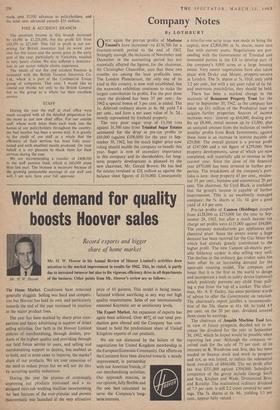Company Notes
By LOTHBURY
ONCE again the pre-tax profits of Madame Tusaud's have increased—to £156,700 for a fourteen-month period to the end of 1962. Strangely enough, the inclusion of November and December in the accounting period has not materially affected the figures, for the chairman, Sir Christopher Chancellor, says that these two months are among the least profitable ones. The London Planetarium, the only one of its kind in this country, is now well established, but the waxworks exhibition continues to make the largest contribution to profits. For the past three years the dividend has been 35 per cent.; for 1962 a special bonus of 5 per cent. is added. The ls. deferred ordinary shares at 4s. 9d. yield 7.4 per cent., and have a net asset value of 3s. 2d., mostly represented by freehold property.
The very poor sugar crop of 13,500 tons against 16,500 tons from Trinidad Sugar Estates accounted for the drop in pre-tax profits to £69,000 (against £108,000) for the year to Sep- tember 30, 1962, but the much higher price now ruling should enable the company to benefit this year. Sugar is now of secondary importance to this company and its shareholders, for long- term property development is planned by the new chairman, Mr. Gerald Brown. He has had the estates revalued at £31 million as against the balance sheet figures of £154,000. Consequently
a nine-for-one scrip issue was made to bring the capital, now £2,808,000 in 5s. shares, more into line with current assets. Negotiations are pro- ceeding with the Government of Trinidad and interested parties in the US to develop part of the company's 9,000 acres as a large housing estate. Very recent negotiations have also taken place with Drake and Mount, property-owners in London. The 5s. shares at 3s. 10-td. only yield 3.2 per cent., but with a net asset value of 6s. 6d. and enormous possibilities, they should be held.
There has been a marked change in the accounts of Beaumont Property Trust for the year to September 30, 1962, as the company has taken up £14- million of the Prudential loan to acquire further properties. Sources of income increases were : interest up £64,000, dealing pro- fits- up £8,000, rental income up by £3,800, plus an unstated amount from the inclusion of twelve months' profits from Rock Investments; against these items is an increase in interest payable of £29,000. The overall picture is a pre-tax profit of £547,000 and a net figure of £259,000. New property developments, some of which are now completed, will materially add to revenue in the current year. Since the close of the financial year £870,000 has been invested in further pro- perties. The breakdown of the company's port- folio is now: shop property 45 per cent., residen- tial 35 per cent., business and commercial 20 per cent. The chairman, Sir Cyril Black, is confident that the group's income is capable of further improvement. This is an excellently managed company; the 5s. shares at I Is. 3d. give a good yield of 4.9 per cent.
Pre-tax profits of Cannon (Holdings) jumped from £128,000 to £219,000 for the year to Sep- tember 29, 1962, but after a much heavier tax charge net profits were £115,000 against £94,000. The company manufactures gas appliances and chemical plant. Since the severe winter a huge demand has been received for the Gas Miser fire which had already greatly contributed to the higher profit. The new Cannon all-electric port- able foldaway cooker is also selling very well. The decline in the ordinary gas cooker sales has been offset by an increasing demand for the open-spit roasting model. The company can boast that it is the first in the world to design and incorporate a built-in safety device (optional) which positively prevents any child from pull- ing a pan from the top of a cooker. The chair- man, Mr. A. E Oatley, has some pertinent words of advice to offer the Government on taxation. The chairman's report justifies a recommenda- tion of the 10s. shares at 41s. 6d. to yield 4.9 per cent. on the 20 per cent. dividend covered three times by earnings.
The chairman of Asquith Machine Tool has, in view of future prospects, decided not to in- crease the dividend for the year to September 30, 1962, which he hoped would be possible when reporting last year. Although the company re- ceived cash for the sale of 75 per cent. of its interests in R. Woodvine and Son, this has been needed to finance stock and work in progress and not, as was hoped, to reduce the substantial bank overdraft of £804,000. The net profit after
tax was £331,000 against £304,000. Subsidiary companies of the group include George Swift and Son, Kitchen and Wade, Drummond Bros. and Rotadip. The maintained ordinary dividend of 7.5 per cent. is still 2.2 times covered by earn- ings. The 5s. shares at 6s. 9d., yielding 5.3 per cent., appear fully valued.


































 Previous page
Previous page